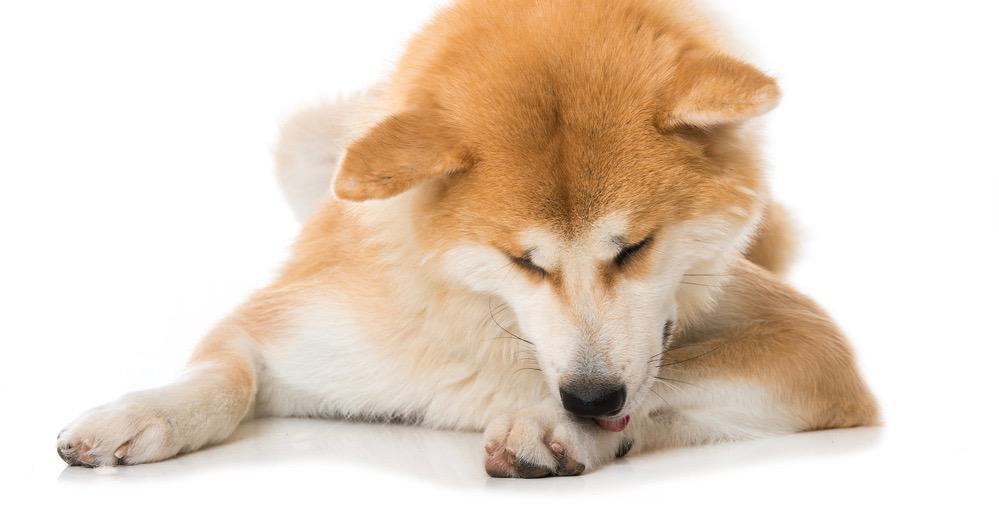While it is natural for your dog to lick their paws when grooming, you may have noticed that they are licking them excessively. And now you may be looking for ways on how to stop a dog from licking paws.
Various reasons can make your dog lick their paws, ranging from allergies, skin issues, injuries, and pain to mental problems.
You must identify what is causing your dog to lick their paws and treat or train them to stop the licking.
This article will provide you with information about the reasons why your dog licks their paws and how to stop dog from licking paws.
show
How Can I Tell If My Dog’s Licking Or Chewing Is A Problem?
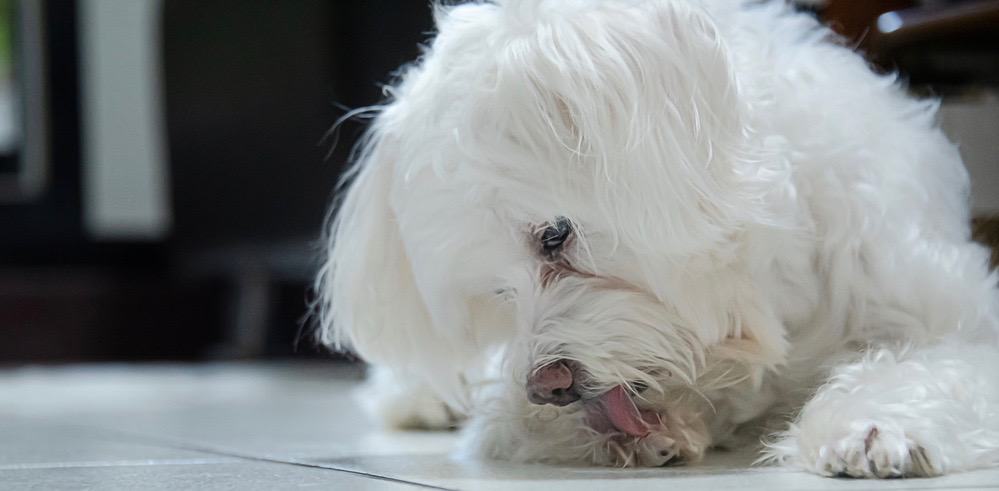
The following are the signs that show your dog’s licking is an issue that needs to be addressed:
- Your dog’s paws are stained with a pink or red color. The stain is clearer in dogs with lighter coats, showing that the porphyrin pigments in your dog’s saliva are in contact with their feet too often to cause a stain. Normal licking is not too frequent to cause discoloration compared to habitual chewing or licking.
- Swollen feet could signify infection or injury due to excessive licking. Alternatively, your dog could be licking their paws because of an injury.
- Smelly paws could be due to an infection of an open wound.
- Your dog is showing signs of discomfort and is limping.
- You notice scabs or blood on the paws.
- Irritation or redness on the paws.
Why Do Dogs Lick Their Paws?
The following are common conditions that may explain why your dog is licking their paws:
Skin Allergies
Also known as dermatitis, a skin allergy happens when the skin comes in contact with a new particle and becomes irritated, which may cause your dog to lick their paws.
Like humans, your dog’s skin can react to certain particles and chemicals. If your dog is reacting to these things on their paws, they will lick it using their tongue as a way of scratching.
When your dog starts licking excessively, you should monitor what substances have been in contact with. They can be man-made, like chemicals used on lawns or natural from plant foliage.
If allergy reactions are left untreated, they can become serious and cause stress in your dog’s body because the immune response causes the release of stress hormones.
Food Allergies
Food allergies can be difficult to identify, and they are known to cause itchy paws.
If you are unsure what food your dog is allergic to, speak to your vet about it and they may suggest eliminating certain ingredients or a special diet to solve the problem.
Cleaning
Dogs lick themselves as a way of cleaning their body. They often lie down and lick their body and legs to remove residue and dirt from their skin and coat. Dog saliva contains enzymes that kill bacteria to keep a wound free from infection.
Naturally, dogs will clean their paws more often because they touch the floor and the ground. This prevents any bacteria that may be on the surface debris from causing skin infection by multiplying.
Dog tongues are effective in removing dirt from the crevices of the paws because they are more textured compared to human tongues.
If you are aware that your dog has stepped into something dirty, you should clean their paws before they clean it themselves by licking. It is easier than letting them ingest what is on their paws, as it can potentially cause stomach upsets.
General Pain
Your dog will lick their paws if they are hurting. Arthritis and other joint problems can cause general pain in dogs. Your dog will lick their paws even if the pain is not directly on them as a nervous reaction to numb the pain.
Dogs like German Shepherds and Labradors are commonly affected by arthritis. This condition causes cartilage wear between your dog’s bones, leading to pain when your dog walks. Your dog’s bones can fuse over time and stop moving.
If you suspect that your dog has arthritis, speak to your vet, and they can prescribe medication and diet to increase mobility and prevent pain.
Injuries
When your dog injures their paw, they will lick it to prevent the injury from being infected and to address the pain. To ensure the injury does not get worse, find, and monitor it.
If your dog starts licking their paws suddenly, he may have burned his paw pad or stepped on something sharp.
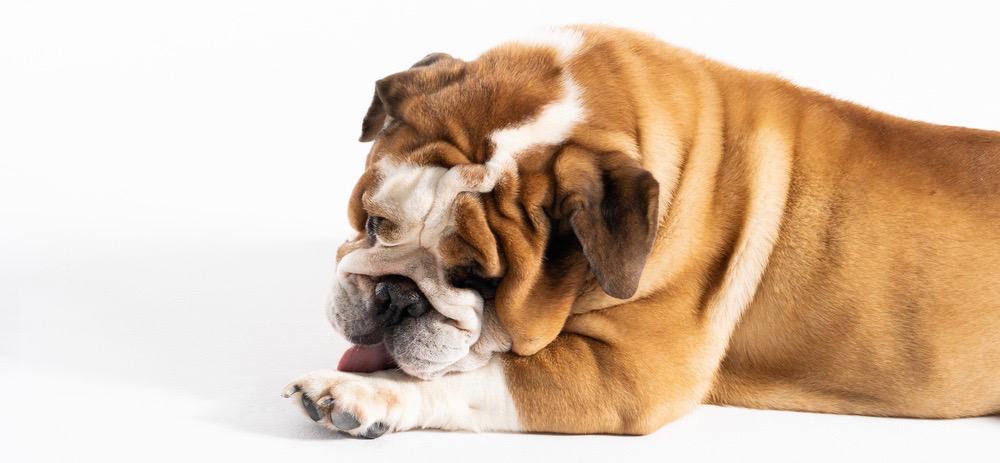
Additionally, your dog may have been stung by a bee or received another insect bite, causing physical reactions and dog paw licking.
Most dogs have a serious or allergic reaction to spider bites or bee stings, even though most insect bites only lead to mild discomfort for a short period. Take your dog to the vet immediately if you notice labored breathing, swelling, and nausea in addition to constant licking.
Sprains Or Fractures
If your dog is licking their paw while also exhibiting other signs like crying during movements or limping, it may be a more severe injury like a sprain or fracture that could be causing paw licking. Watch your dog closely and avoid any unnecessary aggression that could cause the injury to become more severe. A trip to the vet may be necessary.
Burns Or Blisters
If your dog has cracked and reddish paws or you notice blisters or peeling, you may need to see the vet for some pain relief medication. This can happen if they walk on hot pavement or are exposed to certain cleaning chemicals. This can be uncomfortable and painful and can cause excessive paw licking.
Mental Issues
Dogs develop health issues like nervousness or anxiety and become stressed just like humans. If your dog gets worried, they will start licking their paws as a coping mechanism or a kind of nervous twitch.
Boredom could also be the problem. If your dog is not mentally or physically stimulated, they may start licking their paws to pass the time and do something.
Therefore, you should keep your dog occupied through exercise and doing tasks for them to be healthy and happy. When your dog is left at home alone for longer periods, ensure that someone can visit them and walk them.
This is because they may experience separation anxiety, a popular mental condition that causes stress in dogs when left alone. Dogs will lick their paws later as a form of residual stress.
Paw licking can also be a behavioral pattern in your dog. When your dog licks their paws for a period, the licking becomes a habit that stays regardless of the cause.
Since bad habits are hard to break, it can be difficult to stop your dog from licking his paws. Also, if your dog has cognitive issues like autism or dementia-like behaviors, licking their paws can be a habit.
Parasites
Parasite infections like mange or a flea allergy can lead to itchy paws for your furry friend. Your vet will recommend treatments to remove the parasites and relieve the itching. A bacterial or fungal infection may also happen due to the dog licking its paws.
If this is not addressed, occasional licking can turn into excessive licking and more discomfort and pain. Medicated baths and creams prescribed by the vet can help eliminate any bacteria or fungus.
Cysts
If there is a cyst or tumor in your dog’s paw, this can also cause occasional paw licking. Examine your dog’s paws. If you notice any kind of lump or bump that wasn’t there before, you want to make an appointment with your veterinarian.
Secondary Infections
You should understand that paw licking can indicate an underlying problem that may be dangerous for your dog. You should consult your vet to find the cause and the necessary solution.
Do not prolong the licking because the moisture from the saliva can lead to a secondary yeast or bacterial infection, which causes more redness, itching, licking, and swelling.
Why Should I Stop This Compulsive Behavior?
Even if your dog enjoys chewing or licking his paws without any reason, you should consider stopping this habit and compulsive behavior.
Excessive chewing of paws and paw licking can lead to inflammation, skin irritation, hot spots, open wounds, and bacterial or yeast infection.
While it may not be an issue now, you must stop this habit before it is too late and becomes an issue.
How To Stop Dogs From Licking Paws
The following ways will help you stop your dog from licking his paws:
Socks or Dog Booties as Paw Coverings
Your dog will stop licking their paws when you put certain clothing items over the paws. When you cover the paws, the dog cannot lick them. Use a small piece of clothing or sock to wrap around the paws.
You can also use dog booties. When you put a boot on your dog’s paws, it can limit the licking. Your dog can chew through the boot because of irritation; therefore, monitor your dog while on the boots.
Dog booties prevent licking and stop injuries from happening. have multiple socks or boots available to prevent the dog from licking another paw after you cover the other.
Elizabeth Collar
The cone collar or Elizabethan collar is an extreme but the most effective approach to stop your dog from licking irritated paws.
You could already have one since it is provided to dogs after surgery, neutering, or spaying to prevent them from picking up their stitches.
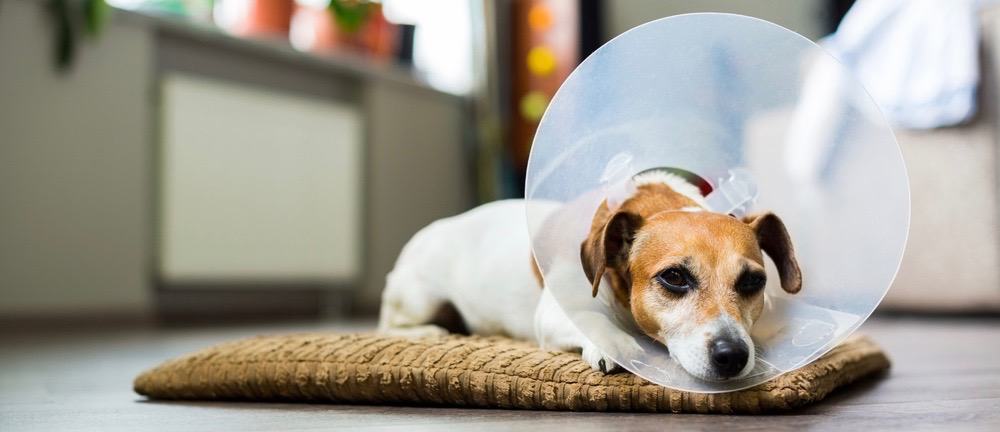
Dogs do not like being in these collars, and you will find them running into furniture with the cone in a bit to get rid of it. Despite the Elizabethan collar being uncomfortable, it keeps your dog from licking any part of its body.
Citrus and Bitter Apple
You can use juice from the citrus fruit to stop your dog from licking his body areas. Dogs don’t like the citrus juice taste; therefore, applying a few drops to the paws will prevent the dog from licking the paw.
The unpleasant taste of bitter apple will also discourage the dog from licking and chewing. It is commercially available and sold in a spray bottle for easy application and storage.
Oranges, lime, and lemon juices can also help your dog stop licking the paw. They will be put off by the smell of it even before they lick it.
Therefore, continuous application on the paw will eventually make your dog stop licking it. The extracts can also be applied to the bandage or socks to prevent the dog from chewing on them.
Tend To The Dog’s Paws When They Come Inside
When your dog comes in from outside, you can prevent excessive paw licking by simply washing and drying your dog’s paws. You should do this if you aren’t a fan of dog booties and covering their paws.
Washing and drying their paws after they venture outside is a good way to protect your dog from environmental allergens and irritants. It won’t prevent an injury like a bee sting, but it can definitely help with atopic dermatitis, which is common with walks and outdoor time.
Use a Moisturizer or Balm
If your dog’s excessive paw licking is due to dryness, then a moisturizer, balm, or dog paw wax are the best solutions. Before applying the balm, make sure the dog’s paws are clean and dry. Choose a product that contains natural ingredients like coconut oil or shea butter.
Follow A Well-Rounded Diet And Routine
If your dog’s paw licking is due to boredom, stress, or a food allergy, then look at their daily routine to find the best solution. If it is an allergy, consult your veterinarian and find a more suitable dog food.
It is also necessary that your dog gets a good amount of exercise each day, especially if the paw licking is due to a behavioral problem.
If your dog needs more mental stimulation and you are at work or away, consider hiring a dog walker or sitter who can walk your pet daily. This also helps with any separation anxiety issues they may experience.
You want to maintain a safe space at home for your dog and ensure that all triggers are eliminated to control their stress levels.
Dog Training To Stop Licking Their Paws
You can train your dog to stop licking the paws without using collars, coverings, or topical treatments, but with great supervision.
First, break the licking habit by occupying your dog with a lot of activities. When your dog is busy, he will not lick the paws. Secondly, provide your dog with toys and other more desirable distractions.
Make a distinctive sound like “eh!” when you see your dog licking the paw to get their attention and stop them from licking. If they repeat the licking, repeat the sound, and praise them when they stop, they will soon learn that you don’t want them to do the licking habit.
Once they are aware that the habit is unwanted, you can easily interrupt them if they start and redirect their attention to a chew toy or something else. Monitoring this will minimize the licking if it is a habit and not because of an underlying cause.
Identify And Avoid Allergens
Your dog’s itchy paws could be caused by recently planted trees, shrubs, or grass. The best way to know if a plant makes your dog bite and chew his feet is by performing intradermal skin testing with the help of a veterinary dermatologist.
You can check local pollen reports online to determine what your dog reacts to. Dogs are believed to react to pollen on their skin when in contact or when they inhale.
If you want to reduce the exposure, do not walk your dog during times of high pollen. These times are between 5 am and 10 am, then again at dusk.
Provide your dog with dog boots to keep their feet clean when you take them for walks outside during allergy seasons.
Probiotics For The Immune System
The veterinary communities have widely embraced probiotic supplements as safe and beneficial to dog health conditions.
The greatest part of an immune system is in the gut; therefore, feeding friendly bacteria to it creates a good effect on the whole body.
A Trip To The Vet
If you find that all the tactics are not working with your dog and he still licks the paws obsessively, visiting a vet might be a better idea.
Your vet will be able to investigate the paws in much detail and can tell if any is bothering your dog’s skin. It could be a joint pain that’s causing the nervous response.
How To Stop Dog From Licking Paws? Home Remedy
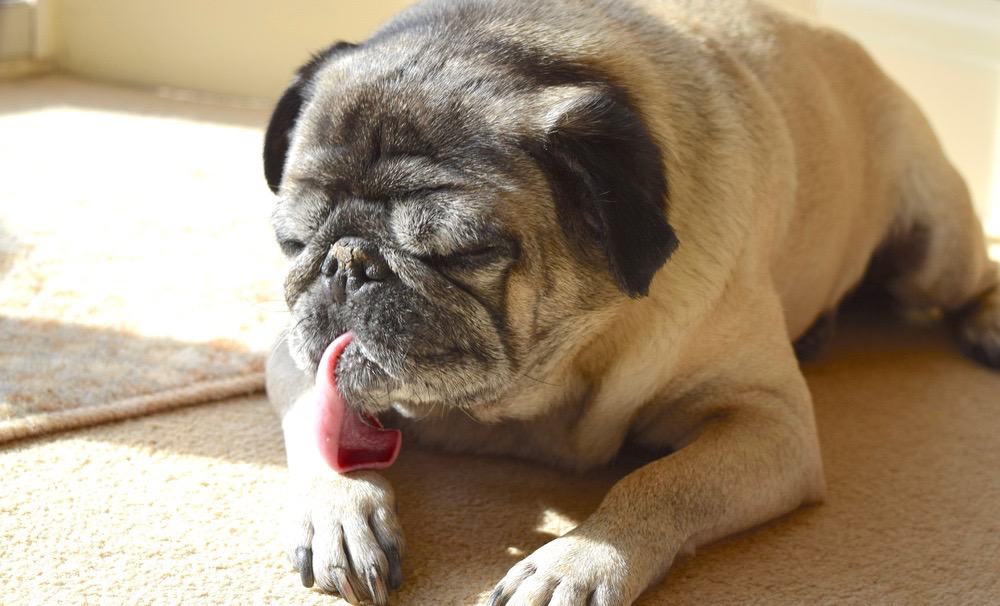
The following are the home/natural remedies you can apply to help your dog stop licking his paws. If you are not sure whether any of the remedies explained below are safe for your dog, speak to your vet about it:
Diet Improvement
Again, it may be beneficial to look into your dog’s diet and evaluate what might be causing the allergies. You must feed your dog food that is high in quality, free from allergens and has lots of fatty acids, which are beneficial for dry skin.
When changing your dog’s diet, you should do it slowly to avoid upsetting their stomach. Speak to your vet about how to change your dog’s diet.
Cleaner Environment
Dust mites and dust can cause allergic reactions in some dogs. Therefore, you should wash their bedding in warm water once per month and dry it in the sun.
When your dog is having a reaction, wash the bedding once per week. Dust your furniture and mop/vacuum the floors at least once weekly. Avoid using strong cleaning products and fragrances.
During the seasons when there is high pollen, close the windows and the doors.
Wash Your Dog
You should wash your dog once per week if they are licking themselves to remove dirt from their paws.
Use a dog shampoo and moisturizing conditioner when washing them. Make sure to rinse their feet on the bottom and top and between their feet.
Aloe Vera Gel
You can apply aloe vera gel to soothe your dog’s irritated skin. Apply small amounts, as it should be an issue if your dog licks it. However, if your dog is sensitive to it and their skin worsens, stop using it.
Tea Rinses
Tea rinses are a natural remedy for relieving itchy skin. You can make the herbal tea using dried chamomile, calendula, nettle, green tea, or yellow dock.
Put one tablespoon of the herb in a cup of boiling water and let it boil for five minutes. Then strain the herb and let the tea cool before putting it in a dish.
Let your dog stand in it for five minutes. Do this twice every day to relieve the irritation. Alternatively, you can soak a clean cloth with the tea and then cover it on the affected area for five minutes twice daily.
Grated Cucumber
Cucumber is known to soothe inflamed skin. Grate a cucumber and compress it over the affected area for five minutes. Do this twice a day to reduce inflammation.
Flea Treatment
If you think fleas are irritating your dog’s skin, use flea treatment to get rid of them.
Baking Soda Bath
To soothe your dog’s feet, bathe them in a mixture of baking soda and warm water. Keeping their feet in this mixture for about ten minutes will reduce the discomfort and itching and possibly reduce the licking.
Coconut Oil
Since coconut oil has antibacterial and antifungal properties, applying it to your dog’s paws will relieve irritation. Also, coconut oil helps in combating yeast or bacterial infection.
Final Words
Do not ignore it when your dog licks their paws excessively. It could be the start of an issue or a sign of a more serious problem.
Even though dogs clean themselves using their tongue, licking that affects the skin should be monitored and stopped immediately.
Talk to your vet about the issue of paw licking to give recommendations on what you can do.
Hopefully, this article has given you information on how to stop dog licking paws.
Frequently Asked Questions
Can you give your dog Benadryl for itching?
Benadryl is a good medication a pet owner can use for dogs who have mild to moderate allergies. These include a seasonal allergy, environmental allergy, food allergy, or a reaction to a bug bite. Most dogs will react positively to Benadryl.
Does your dog need a referral to a veterinary dermatologist?
You will often need a referral from your regular veterinarian to make an appointment with a veterinary dermatologist. However, there are some cases the regular vet can help without sending you to a specialist.
Why do dogs lick their paws after they eat?
Sometimes a dog will start licking their paws after a meal. This doesn’t mean they are still hungry. It is just a part of the dog’s self-grooming habits and isn’t a cause for concern. The dog may also lick their paws after sitting in their bed as well.
What causes a lick granuloma?
Behavioral conditions and allergies are the two most common causes of a lick granuloma. If your dog licks their paws excessively because of boredom or because they are anxious and stressed, lick granulomas can form and are then infected with bacteria.
